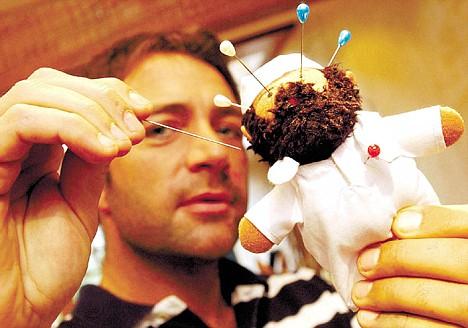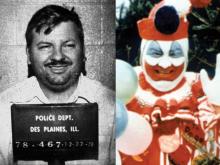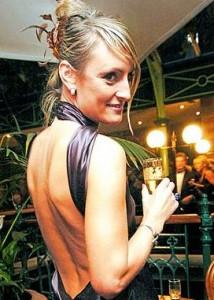 Kinga Legg
Kinga Legg
The murder of Polish millionairess Kinga Legg at the 5-star Le Bristol Hotel in Paris has been solved but her murderer may forever remain unpunished.
In the language of luxury hotels, it was the quietest hour of the day: 8 p.m.
The carpeted corridors of the 5-star Le Bristol Hotel on Paris’s Rue du Faubourg Saint-Honoré, named after the 6th century Saint Honoratus, protector of wheat growers and bakers, were deserted.
There were no chamber maids chattering behind their service trolleys, no droning of vacuum cleaners, no tinkling of crystal as waiters from “Room Service” refilled mini-bars with cute little bottles of whisky, brandy and France’s finest wines.
And not a sound from behind the closed doors of the rooms and suites that cost between $1,100 and $3,300 per night. The doors, especially thick, make the rooms soundproof.
On the fifth floor, from the shiny brass knob of the door of Room 503, hung a “Do Not Disturb” sign. That morning – Tuesday, May 26, 2009 – a man had called the desk of the hotel’s “Concierge” to warn that “Madame Kinga Legg,” one of the double room’s occupants, did not wish to be disturbed. In Le Bristol, known as “one of the best of the best” of Paris hotels, a guest’s wish was never ignored.
Nonetheless, a few minutes after 8 p.m. the floor’s manager and a maid approached the door. This particular guest’s brother, named Marek Wolf, unable to get hold of his sister on her cell phone, had already called the hotel several times from his home in Poland to request that someone should go up to Room 503 to see whether “Madame Kinga Legg” was alright.
Kinga Legg, a tall, slim blonde had booked into the hotel three days previously, on Saturday, May 23. She was sharing the double room, classified as “Superior” that cost $1,500 a night with the man who had booked in with her: dark-haired, well-dressed, good-looking Ian Griffin. The two had turned up in a $133,000 black Porsche 911, registered in England. They were not strangers to the hotel: They had already stayed there three times.
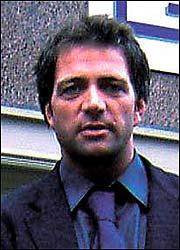 |
|
Ian Griffin |
Ian Griffin, believed by the staff to be an English viscount, had left the hotel at 4 p.m. He had not booked out; he had just driven off, having asked at the “Concierge” desk for his Porsche to be fetched from the underground car park.
Outside Room 503, the floor manager knocked all of 12 times with his pass key’s metal holder at the door, but, after no response, he inserted the computerized key card into the lock.
He was speechless at what he saw once he and the maid were inside the room; it was so very unlike the way the hotel’s guests – among them regulars like Robert de Nero, Leonardo DiCaprio, Johnny Depp, Bruce Willis, Pamela Anderson and George Clooney, and many heads-of-state and members of royal families – leave their rooms.
The room, decorated in yellow and beige, looked as if half a dozen thieves had been looking for something in there and disappointed at their failure had used some strong-arm tactics to get whoever was in the room at that time to talk.
Yellow-brocaded, 19th century-style chairs lay, broken, on the floor. A heavily-framed painting had been ripped from a wall. Several large vases had been knocked over, the flowers that had been in them, lay trampled beside them. A lamp with an ornate gilded stand also lay on the floor. So did the television set. Even the heavy yellow curtains had been ripped from their railings.
On the bed, unmade, lay a woman’s black fur coat. Beside the bed stood a small, bulging suitcase: it looked ready to be wheeled off.
But what the floor manager found most alarming were the dark stains on the beige wall-to-wall carpeting and on one of the walls.
The door to the creamy-white bathroom was ajar.
It would have been possible to describe it as “clean and everything – the miniature bottles of complimentary big name perfume, body lotions and bars of soap, the bathrobe and slippers with the hotel’s logo – where they should have been,” but there was a naked blonde in the bath tub. She was not having a bath – there was no water in the tub – and she looked very dead: Her head slumped forward and her arms lay motionless over her torso as if to hide her breasts from unwelcome eyes.
It did not take the police long to follow up on the hotel’s call for assistance.
At first, only a small squad car with four uniformed cops pulled up discreetly – no blaring siren, no flashing red light - in front of the brightly, almost festively-lit, hotel.
Rue du Faubourg Saint-Honoré in the chic 8th arrondissement is not very wide – it’s just about the size of one of the sidewalks of Avenue des Champs-Ėlysées – but it is a street that leaves women dreaming and envious because of its shops; almost every major global fashion house has a boutique there. And it is also on this street where the U.S. ambassador’s residence is (No. 41), and that of the Canadian ambassador (No. 135). The United Kingdom’s embassy is there too: at No. 35. And the official Paris residence – the Ėlysée Palace – of France’s presidents is at No. 55.
Le Bristol Hotel is at No. 112, and two liveried footmen in long brown jackets and busmen’s caps, blasé after years of seeing the beautiful, rich and famous walk through the glass doors behind them – President Sarkozy and his wife the former singer and actress Carla Bruni are regular lunch or dinner guests – that they paid the four uniformed cops who stepped from the squad car little attention. Police vehicles and cops were certainly not a novelty on the street; the presence of the president’s residence and those three embassies even made it a necessity.
Soon, the street were swarming with uniformed and plainclothes cops, police vehicles, and red ambulances fitted out like hospital operating theatres where even “flat-liners” could be brought back to life.
Kinga Legg could not be brought back to life.
She was dead for sure.
Maybe she had killed herself: White-coated, masked and gloved police pathologists who stood at the bath, its 24K gilded faucets almost blinding them when the lights of the cameras of the guys from “Forensics” flashed, thought that the bruises on her face, head and body, ugly as they were, could not have been fatal. Maybe, they thought, she’d had a fist fight with someone and afterwards, depressed and with no wish to continue living, she had finished a bottle of barbiturates or sleeping pills. There were certainly a fair number of bottles of both in the room.
Who was Kinga Legg? Who was Ian Griffin? Seeing Kinga Legg was dead, where was Ian Griffin? Did he have anything to do with the young woman’s death?
The cards the couple had completed on booking in at Le Bristol, identified Kinga Legg as Polish, and Griffin as British.
She was born in Opatówek, west-central Poland, in 1973. That made her 36 years old.
He was born in 1969 in the town of Warrington (Pop: 195,000) in the English County of Lancashire. This made him 39 years old. (England and Wales are divided into counties.)
Both, according to the cards, were resident in England, in the town of Oxshott in the County of Surrey, south of London.
They were not going to return to England on leaving the hotel, but were going to continue on to the town of Port-Leucate in southwest France.
In the course of the following morning – Wednesday, June 27 - the French police notified Scotland Yard that a British national named Ian Griffin from Oxshott was wanted for questioning in connection with the death in the Paris hotel, Le Bristol, of a woman named Kinga Legg.
Breaking News:
When agency reports began to appear on the computer screens in the newsrooms of London’s dailies, editors had no problem writing the “breaking news” splashes.
The dead woman and the man Scotland Yard were looking for to “help” them with their “inquiries” were not unknowns.
Kinga Legg was a self-made millionairess. Some, perhaps not so kindly, sometimes referred to her as the “tomato millionairess.” As incredible as this might sound, she had made her money growing and selling tomatoes.
When she came into the world in Opatówek (pop 3,800), she was Kinga Wolf, the daughter of a German father named Jan Wolf and a Polish mother named Halina. Both Halina’s father and grandfather had been tomato farmers: the grandfather had had his own farm, but after World War Two when Poland had turned Communist, his son, Halina’s father, had to turn the farm into a cooperative. No less successful as a Russian-style “collective farm,” when Halina and Jan Wolf took over the farm at the collapse of Communism in 1989, they counted among the region’s “new rich.” Not that the teenage Kinga Wolf put on airs: those who knew her those days told journalists after her death that she was always polite and smiling. The local priest also spoke tenderly about her. She was a devout Catholic and attended Mass every Sunday, he said.
In 1995 Kinga Wolf met an English civil servant and municipal councilor named Peter Legg whom she was to marry. From Preston (pop 131,900) in County Lancashire, Peter Legg had gone to Opatówek for the twinning ceremony of his town with the Polish one. By then, 22 years old and every inch the Slavic blonde beauty of men’s dreams, and very articulate – she was fluent in English, French, German and Russian – Kinga Wolf knocked the Englishman off his feet.
Six months later, in 1996, she joined him in Preston and became Mrs. Peter Legg in a simple non-religious wedding ceremony attended by only 20 guests.
With the collapse of Communism many young people from the former Communist Bloc were in the United Kingdom and Europe looking for residence and work permits, and the girls were even looking for a British husband who would supply a British passport, and this made some of Peter Legg’s colleagues think that this was the reason why the vivacious Kinga Wolf had married him.
But Mr. and Mrs. Peter Legg seemed happy.
She began to study International Marketing at the Preston-based University of Central Lancashire and he became head of Enterprise and Employment at the Municipal Council in nearby Blackpool (Pop: 142,900).
The two rented a large house in the neighboring town of Poulton (Pop: 19,000) also in County Lancashire, and joined the tennis club and became regulars at the local pub, the Thatched House.
Back home in Poland, Kinga’s brother, Marek Wolf, had started to run the family tomato farm. The Wolfs by then had 45 hectares under tomatoes and had begun to supply vegetable markets and shops all over Poland; the business was registered as the Polish company, Vegex.
The Wolfs’ local success and prosperity gave Kinga an idea: They could sell their tomatoes in the United Kingdom as well, and she started to negotiate with Lancashire businessmen.
Soon, the Legg marriage began to crumble and within two years Kinga moved out and rented a place of her own. As was her plan, she began selling Vegex’s tomatoes to wholesalers in England. The United Kingdom branch of the business was slow to take off though; in its first year the turnover was just $83,000, but it did not dampen Kinga’s enthusiasm for the red fruit. Consequently, in 2003, she took over control of Vegex with the full support of her parents and brother.
The increased workload did not however turn Kinga into a stern, grey-suited entrepreneur who spent her nights alone watching television, her only companion, a stiff drink. No, her social life lifted off; when she was not flying business class to Poland, she was living it up in the clubs in Lancashire.
Neither did her love life suffer.
She commenced a relationship with the English property and hairdressing salon tycoon, Harry Gaynon. When the relationship ended she started seeing another wealthy man. He was the gray-haired, distinguished-looking Eric Kilby, chief executive of the British branch of the Canadian company, Crown Wallpaper, director of several others, and 28 years Kinga’s senior, whom she had met while she’d briefly worked for billionaire racehorse owner and gambling tycoon, Trevor Hemmings. Kilby was a director of one of Hemmings’s companies.
Kinga and Kilby’s affair however had to remain a secret. He was married: It was his second marriage and his wife, Rosemary, had given him two sons in their 13 years together. However, the secret was soon no secret at all as the two started to turn up at parties together too often for it to have happened by chance. But as the Lancashire moneyed set said, Kilby appeared to have a good effect on Kinga because where she had been finishing off bottles of champagne at an alarming rate while dating Gaynon, when with Kilby, she remained sober.
They also noticed that Kinga was always dressed to the nines. So she could be. Her new lover adored her and loved buying her expensive gifts, and Vegex was making money: Kinga, socializing with such high fliers as Kilby, a millionaire, and his millionaire associates and friends, it was sure to have become a success.
In August 2003 both the respective spouses of Kinga and Kilby sued for divorce. The two lovers were by then living together in a Victorian mansion in Wilmslow (Pop. 30,200) in County Cheshire, adjoining County Lancashire, and Vegex had an impressive client list: Kinga had become McDonald’s tomato suppliers and the United Kingdom’s biggest supermarket chain (Tesco) and France’s biggest (Carrefour) were buying from her.
Three years later, in 2006, Kinga and Kilby were married. The marriage was as secret as the relationship had been in its first months, and, therefore, it took the British media three days before it could reveal that on her death Kinga was in fact a married woman. As the London national, The Daily Mail, (June 6, 2009) revealed, Kinga and Kilby were married in a Roman Catholic chapel outside Opatówek. The setting could not have been more romantic; the chapel, of dark wood with small stained glass windows and a tall wooden cross stood in a clearing in wood that encircles the town. The wedding reception attended by not only all those from Kinga’s childhood but also the town’s administrators, was held in a private mansion on the shore of one of the many lakes in that region of Poland and known as “the palace in the woods.”
Kilby built his new bride a large house close to another of the lakes. The house reminded the locals of the one at Southfork Ranch in Texas where Miss Ellie ruled over her quarreling brood; episodes of the series “Dallas” still runs on Polish television networks late at night. The house was equipped with surveillance cameras and an electronic security gate.
But the marriage was not to last.
Kinga Legg – for professional reason she kept using the surname Legg – met Ian Griffin. Or rather she’d met him in 2005 already, but whether she was two-timing Kilby, only Ian Griffin now knows.
Bankrupt Playboy:
Ian Griffin always had much to say about himself.
“Hi, my name is Griffin, Viscount Griffin, but you can call me Ian. I don’t like to stand on ceremony,” was how he introduced himself.
Griffin’s was a life of untruths and the most blatant one that he told was that he was a viscount. (In the order of precedence of royal titles, that of king and queen regent is highest while viscount or viscountess, ranks third from bottom in a line of fifteen.)
Anyone who wished to verify whether Ian Griffin was really a member of the United Kingdom’s aristocracy only had to check his birth details in the public records and they would have learned that he was born the son of an architectural draughtsman and land surveyor named Bernard Griffin. The latter was not a poor man, but he was indeed not a viscount, and never had he claimed to be one. And even if he were a viscount, as he was still very much alive, he would have been holder of the title.
The truth was therefore that Ian Griffin was born on June 3, 1969, the son of ordinary, “untitled” parents – Bernard and Janet Griffin – from Warrington.
He went to the local Appleton Hall Country Grammar School. (A “grammar” school is a day-school that is only partially state-funded which means that the parents of pupils need to pay school fees although these would not be as high as those of a “public” school – like Eton – which in fact is a private school completely funded by tuition fees.)
He was known as a lazy and spoiled child but one who could all the same be charming when he chose to be.
He also chose to brag and this he did when he joined the school’s “Friends Reunited” website a couple of years ago. Under his profile he wrote: “I do not feel it is necessary to bore you all with my incredible success over the past 17 years. I would just like to say if any of you have mustered up a fraction of what I have accomplished, well done! If not, contact my PA for some advice. I have read all your notes, and to be quite frank none of you sorry lot have accomplished anything apart from babies, dogs and goldfish. What a sorry state of affairs.” He attached pictures of a Lamborghini, a Rolls-Royce, a Ferrari and silver-metallic Mercedes SL making out that they were his. He also attached photos of yachts and of a mansion and of him drinking champagne on a private jet. As for what he did for a living, he attached a photo of him outside a gadget shop as well as an advertisement for a spray-tanning booth. “Give you a wild guess who owns the world intellectual property rites (sic) to this baby!” he added.
What he did not say was that he had no money at all: he was bankrupt, declared so in December 2006.
By then Kinga was already in his life. Did she know that her new lover was penniless? She did never admit this to friends, but he might well have fooled her too, but perhaps only initially. But when they met what there was to know about him were that he had once been a male model – he told people this often enough; Eric Clapton, the English blues-rock singer, song-writer and guitarist was a friend and that he had once been the owner of an orange Lamborghini he had bought from the singer; he had “invented” an Osama Bin Laden voodoo doll of which he had sold millions on the web; his spray-tanning booths had proved such a success that he’d expanded to Spain, and he was worth $73 million.
|
|
|
Griffin with his Osama Bin Laden doll |
All that was true was that he had once “invented” an Osama Bin Laden voodoo doll and that he did open spray-tanning booths in Spain. He certainly did not say that he had spent a few months in prison in Spain for tax fraud when the Spanish venture had had to close for lack of capital.
But once Griffin and Kinga were together, they moved south, crossing the “North-South Divide” that roughly runs from the town of Hull in northeast England southwest to the own of Bristol. North of the line the people were understood to be poorer than their southern neighbors. It was then that the two settled in Oxshott (Pop. 6,100). The town is in what is known as “stockbroker belt”; it is there where properties are most expensive, cars are bigger and faster, and almost everyone plays golf on weekends. In 2007, the London national The Daily Telegraph even named Oxshott the most expensive place to live in the United Kingdom.
Kinga Legg moved the British branch of Vegex to Oxshott too.
Meanwhile, Kirby licked his wounds. He was devastated at having lost Kinga to another man. As the The Daily Mail was also to report on June 6, 2009, he was the one who the French police summoned to Paris to identify her body. The daily quotes him as telling friend that it was an “absolutely horrendous” experience and one of the darkest moments of his life.
Love going all wrong:
Kinga’s friends would, also according to The Daily Mail, say after her death that she should have stuck with Kirby. He adored her and he pleaded with her to stay with him, but, as they said, “Kinga had done what she always did: target a wealthy man, love him for his money and then move on.”
However, while Kirby licked his wounds, Kinga and Griffin lived it up in Surrey’s trendy bars and clubs.
Both were drinking a lot, drinking too much, and often, when they’ve had a few too many they quarreled loudly. At home – a rented two-story red-brick mock Edwardian mansion with Gothic-style mullioned windows worth $8 million with a weekly rent of $8,000 – their quarrelling turned violent: She, the one committing the violence. She hurled objects at him. She hit him.
In October of 2008, he summoned the police when she threatened him with a knife but he dropped the case once they’d made up again.
A while later it was her turn to summon the police; he had hit her she claimed, but the police only cautioned him not to do so again or he would be locked up.
The two started to suffer bouts of depression which meant that to the alcohol they added anti-depressants and sleeping pills. Some of their friends would later say that the two were also sniffing cocaine; they thought that both needed professional help.
Griffin agreed, but he was alright he thought; it was only Kinga whose addictions were out of control. He persuaded her to enter the North London exclusive private clinic, “The Priory.” It is there that the United Kingdom’s show business “stars” go to be cured of their addictions, be these drugs, alcohol, smoking, eating or gambling.
If Kinga’s dry-out had been a success, it had been so only for a while, because soon she was back in the bars and clubs, a glass of champagne in her hand.
Therefore, Kinga being back on the drink, the violence between the couple recommenced.
In April of 2009, just a few weeks before Kinga’s death, Griffin e-mailed a photo of himself to a former girlfriend, Tracy Baker. He wanted her to see his beaten and scratched face. As he told Ms. Baker the argument that had led to the violence had been because the two of them have remained in touch. “He was the target of a lot of violence from her and he couldn’t really cope with it. She was very possessive. She tried to control him. I think because I was still in the background she was jealous. He wasn’t sure he could cope with her,” Ms. Baker told journalists. She also spoke of how Griffin had found a tracking device on his Porsche which he thought Kinga had put there.
At around that time Kinga told Griffin that she was going to leave him. She wanted to leave England too to settle in Paris.
But she changed her mind about both.
In May, she rented a 65-foot yacht, which its English owners had amusingly named Overdraft, for a Mediterranean cruise. Media reports valued the yacht, which she was to collect from the marina of the select French resort of Port Leucate on the French Mediterranean coast, at $2.4 million. Kinga had agreed to an $8,100 daily rental.
The cruise was not only going to be her gift to Griffin for his 40th birthday on June 3, but it was also her reconciliation gift to him.
Griffin was delighted, delighted to have her back and delighted about the cruise. He had a boat of his own, the 18-foot, $40,000 powerboat Madog. It was moored in the elite Shepperton Marina on the River Thames close to his Oxshott house along with the powerboats of other “stockbroker belt” residents. At that time the boat was in the marina’s dry dock being treated with anti-fouling paint so that it could be taken to sea.
The couple decided that they would drive to Port Leucate in Griffin’s Porsche and stop for a few nights in Paris’s luxurious Le Bristol Hotel.
Paris, City of Lovers:
Griffin and Kinga did not like the room Le Bristol’s “Reception” offered them. They wanted something more luxurious, and, being “regulars,” they knew that they could ask for another. “Prestige” Room 503 with its yellow decor was excellent. So was the bottle of complimentary champagne they found waiting for them in an ice-filled silver bucket.
The Paris weather was excellent. On Saturday, the day of the couple’s arrival it was 24° (75.2°) and on Sunday 29° C (84.2° F). The Paris bistro and restaurant owners had hastily retrieved tables and chairs from their storerooms to set out on terraces and on the sidewalks: The Parisians, after a snowy winter, all seemed to be very thirsty for tall glasses of exotic drinks.
The Le Bristol’s staff noticed that the couple in Room 503 kept on ordering bottles of champagne. Well, it was hot and if one had that kind of money, why ever not.
By Monday the two beautiful people no longer looked so great; Griffin’s face was red and puffy and he had bags under his eyes, and Kinga was agitated and short-tempered.
That evening they set off by taxi for Avenue des Champs-Ėlysées; it was only a few minutes drive away.
It was still hot and overhead dark clouds were gathering; anyone could see that a storm was in the making.
As those at the hotel who had been watching Griffin and Kinga could see, there was also a storm brewing between them.
The two shunned Le Bristol’s 3-star (Michelin Guide 2009) restaurant – in 2004 George Clooney had treated the cast of Ocean’s 12 to a $3,500 champagne and fois gras party there – and went to a smart restaurant on Avenue George V. (All restaurants on the avenue, obviously protecting their reputation, would not confirm to this writer that it was at their establishment that the couple had dined.)
From the time that the two sat down they argued. They ordered a bottle of champagne and chose from the menu, still arguing, making little effort to keep their voices down. Suddenly, towards the end of the meal, Griffin hurled a champagne flute across the room. Then, he got up and stormed out. The diners looked the other way and continued eating, and the waiters waited a few minutes and then one of them nonchalantly picked up the pieces of glass and carried them to the kitchen in a napkin. As for Kinga, without even a flush, she finished her flute of champagne and she settled the restaurant’s check with her credit card and also left.
Griffin, after having stormed from the restaurant, had returned to the hotel. Kinga also returned to the hotel and went up to the room.
Outside, large raindrops began to pelt the hotel’s façade, and thunder roared over the Paris rooftops.
The storm had started.
Looking for Griffin:
The moment the Paris criminal police notified Scotland Yard that they would like to question a certain Ian Griffin, a British national, from Oxshott, Surrey, about the death in a Paris hotel of a woman named Kinga Legg, a Polish national who has been residing in the United Kingdom, the Yard alerted the police chiefs in the various English towns connected to the couple.
Henri Moreau, the criminal police officer in charge of the investigation in Paris, had a hunch that Griffin would have made it straight for his own country. He realized of course that Griffin with a head start of several hours over the police, and behind the wheel of a fast Porsche, could be in any of the countries bordering France: Belgium, Luxembourg, Germany, Italy, Switzerland and Spain: The Principality of Monaco also borders France but because of the open-border policy between the two states it would be unlikely that a French fugitive would flee there. He could even have reached the Mediterranean – it was a five-hour drive – and could be on a ferry on his way to North Africa – Morocco for example. Or, Griffin, a man with a boat of his own and therefore someone who knows about sailing, might have rented a small cruiser in one of the French or Italian Rivieras’ towns and could be on his way to just about anywhere in the world.
The French officer’s hunch was correct: Griffin had gone back home. Or rather, he had gone back to England. The Yard had found that he had driven the 184 miles from Paris to the port city of Calais and there, on that Tuesday night, he had boarded a Channel tunnel or “Chunnel” car-carrying train for the 35-minute underwater ride to Folkestone on England’s County of Kent coast.
The Yard also had further information for their French counterparts.
From Folkestone Griffin had driven straight to Shepperton Marina to get to his powerboat. It was a drive of 76 miles. There, on Wednesday morning, he had become agitated to learn that his boat was still in dry dock. He asked if he could rent, even buy a small cruiser, but told that there were none available to rent and to buy one would take a few days, he drove off in his Porsche, but not before he had bought a marine satellite navigation system and a set of CD-ROMs of British and European navigational charts.
Later that day, the Porsche was found abandoned in the driveway of his parents’ house in Warrington, another five-hour drive away. His parents, when questioned by the police, said that they had not seen him for “some time.”
The Yard now alerted the Lancashire police that Griffin was in their area. And that he might have hired a car, but that he was more likely to be on foot. Like in some U.S. states, in the United Kingdom also, a private individual has the right to make a “citizen’s arrest,” and in this case, in media reports, the police warned people not to approach Griffin because he could use violence against anyone trying to restrain him: The Paris police had told their English counterparts that he was “dangerous and volatile.”
The week ended and there had been no sightings of Griffin, but Kinga’s credit cards were being used. That Friday – May 29 – he had even withdrawn a “large” amount from a cash distributor, as the police told journalists.
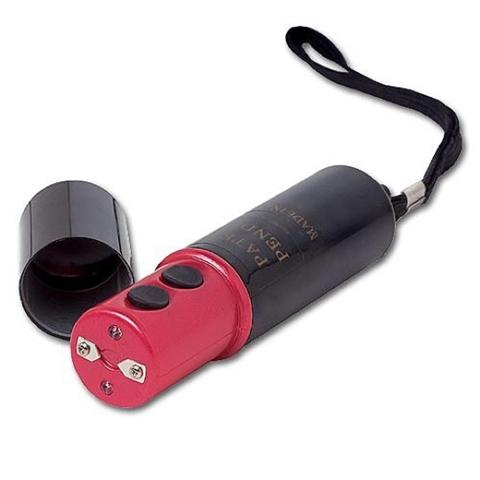 |
|
Stun-gun lipstick |
Ms Baker, Griffin’s former girlfriend also told journalists that he had telephoned her that Friday and had told her that he and Kinga had had a “massive fight” in their hotel room and that he had not willfully killed her. He had only defended himself because she had attacked him with a stun-gun disguised as a lipstick. She had, he said, bought it that Monday in a shop in Paris; such self-defense items are freely on sale in France, but buying a firearm is however extremely difficult, close to impossible. Such a stun-gun can also be bought on the Internet at slightly over $30.
As the police already knew from Griffin’s cell phone operator, he was in Lancashire when he had made the call.
By Monday, June 1, the police also had several reports of sightings of Griffin. He was described as looking disheveled and unshaven like a man living rough. Someone reported that there was indeed a man living in a small tent in a wood near to the town of Chelford, 20 miles from the home of Griffin’s parents in Warrington.
At 3.30 p.m. the police approached the tent and arrested Griffin. He was driven to the police station in the nearby town of Middlewich where there were custody facilities, and locked up. He was no longer in a “volatile” but in a “deeply depressed” state, and friends told journalists that he might well commit suicide. He was arrested under Section 9 of the “Offences Against the Person Act” of 1861 which covers the murder or manslaughter committed outside the United Kingdom by someone who either resides in the UK on a permanent basis or had fled to the country.
On Wednesday, June 3, the day that he should have been sipping champagne on the yacht Overdraft celebrating his 40th birthday with his lover, he was standing in the box of the accused in London’s City of Westminster Magistrates’ Court listening to District Judge Daphne Wickham say that France had requested his extradition “in connection with this offense of murder.” Since March 10, 1995, member states of the European Union are obliged to surrender their nationals to each other provided that the felon in question consents to extradition and the requested state has given its agreement because the requesting state has provided adequate information with regard to the nature, circumstances and consequences of the offence.
Griffin’s defending lawyer, Stephen Vullo, regarded as one of the United Kingdom’s best criminal defense counsels – he recently defended Bilal Abdulla, the Glasgow (Scotland) bomber and Yassin Omar, one of the men convicted of the July 21/ 2005 London bombings – said that his client refused to give his consent to extradition. Griffin, not in his usual haute couture attire, but wearing a $30 off-the-peg “Abercrombie and Fitch” t-shirt and jeans, himself explained to the court why he was not agreeing to extradition. “I’m not up to speed at all. I’m all awash here. I’ve just got back, literally an hour ago,” he said. The judge did not ask him to explain what he meant by “literally an hour ago.” Neither, of course, was he asked to explain what had happened in Room 503 of the Le Bristol; that was something the French would have to do once he was back in Paris.
 |
|
Wandsworth prison |
A new extradition hearing was scheduled for Wednesday, June 10, and Griffin was taken to Her Majesty’s Prison of Wandsworth in the borough of the same name in southwest London for incarceration. Former inmates of Wandsworth, London’s largest prison and one of the largest in Europe, were Great Train Robber, Ronald Biggs (he escaped) and Oscar Wilde, the Irish playwright, poet and author, convicted of “gross indecency” with other men.
On June 10, Stephen Vullo claimed that Griffin’s mental state made it impossible to extradite him. His client, he said, was in the prison’s hospital wing after having had to undergo treatment at St. George’s Hospital in Wandsworth. They were awaiting psychiatrists’ assessment of his mental state. Griffin was too poorly mentally to be in court.
The judge rescheduled the extradition hearing to Friday, June 26, but on that day Griffin was again absent; he was still in the prison’s hospital wing.
Again, the judge rescheduled the hearing to Friday, July 10, but only for Counsel Vullo and Griffin’s second defender, Colin Nott of the top London legal firm of Hallinin, Blackburn, Gittings & Nott, to report further on Griffin’s mental state. According to the firm’s website, Nott is “renowned in particular for his work in the field of extradition.”
On that Friday, Nott claimed that Griffin was still not mentally fit and would not be so, probably, for another 28 days. “He is almost certainly going into hospital in the near future for further tests,” he said.
Another extradition hearing was scheduled for Friday, August 7.
On that day Ian Griffin’s two defenders stated that he was not yet mentally fit. They described him as unable to comprehend what is meant by a “European arrest warrant”, and “extradition.”
He was still in Wandsworth’s hospital wing.
What now?
Ian Griffin is to remain in Wandsworth until the psychiatrists find him compos mentis. Therefore, until he is able to understand what is going on. However long this will take, the French are to be patient and wait, but they already know from the autopsy report that Kinga had died from an internal hemorrhage caused by violent blows to her head, neck and back. The weapon was Room 503’s ornate gilded lamp.
Meanwhile, the body of Kinga Legg, the woman who turned herself into a millionairess growing and selling tomatoes and who died in a hotel on a street named for those who grow wheat and bake bread, has been released to her family in Poland.
She was buried without any hullabaloo.
Extradition :
In May 2011, a full two years after Griffin fled from Paris and the bludgeoned dead body of Kinga Legg, he was back in Paris. Not however as a guest in a luxury hotel, but as one of two occupants of a small cell in the security wing of Fresnes Prison outside Paris. He had finally lost his battle against extradition to France.
French justice is slow, a trial sometimes not commencing for three or four years, and it would not be different for Griffin.
However, in March 2013 after 22 months in Fresnes, Griffin was, as he told the Mail on Sunday in an interview three months later, suddenly one morning told that he should pack his belongings because he was being released. That is, he was still under indictment for the murder of Kinga Legg, but he could await his trial a free man, and as his passport was returned to him, he could do so apparently wherever he wished. The authorities gave no reason for his release other than to tell the media that he was no longer a danger to anyone.
Griffin immediately booked a suite in another of Paris’s luxury hotels, the George V off the Avenue des Champs-Elysèes, and there, at $3,000 a night, he awaited his trial. He did not do so alone but in the company of his former lover, Tracy Baker, the two having rekindled their relationship. She, with total belief in his innocence, had rushed to his side the moment the British police had arrested him back in 2009.
In the luxury of the George V Hotel, Griffin and Baker, as he also told the Mail on Sunday, planned their future together. They were going to get married and start a family and buy or rent a house in the French countryside. No, he did not hate the French and it was in France where he wanted to live.
Trial :
On Monday, December 1, 2014, Kinga Legg dead three and a half years, Griffin and Ms Baker, then the mother of his baby son, arrived at Paris’s Palais de Justice courthouse.
Griffin, 45, his hair not as thick as in 2009 but still pitch black, and a few lines on his face where there had once been none, was leaning heavily on crutches.
In that Mail on Sunday interview he had accused the prison doctor of having damaged his health with the anti-psychotic medication he had prescribed him. The medication, as he claimed, had damaged the nerves to his legs and had even sent him into a coma at one stage. In fact, he suffers from a degenerative neurological disorder.
During the four-day trial the jury listened to witnesses tell of the violent relationship Kinga Legg and Griffin had had. Kinga’s family and friends of Kinga told of how she, very upset, used to telephone them to tell of how Griffin had beaten her. She also accused Griffin of cheating on her with Ms. Baker. She had even told them that should they hear of her sudden and violent death, they need look no further than Griffin.
Ms. Baker on the contrary told of what a kind and loving man Griffin was.
Crying, Baker told the court of the telephone call Griffin had made to her after the death of Kinga, but when he had not told her that Kinga was in fact dead.
“Ian called me and said he’d had an argument with Kinga, telling Kinga that he couldn’t be with her anymore.
“When they got back to the hotel room, Kinga had attacked him with a Taser gun disguised as a stick of lipstick.
“He said he had cuts and bruises all over his body. I didn’t think for a second Kinga would not be OK, because it was normally her attacking him.”
That lipstick Taser, as Griffin had already told the Mail on Sunday in 2009, had a punch of 350,000 volts which was seven times higher than that of the Tasers police forces used.
Griffin, when questioned by the prosecution, struggled to contain his emotions, but he maintained the story he had been telling from the time of his arrest. He suffered from partial memory loss, he said, his only recall of Kinga’s death was that they had had an argument while having dinner and they had returned to Le Bristol Hotel separately and he had found the room in disarray and then he had blacked out. He also repeated the story of how, after coming round the following morning, he had found Kinga asleep and cold, and in order to warm her, he had put her in the bath.
He admitted to having two-timed Kinga with Ms. Baker but only because Kinga was “seeing other men.”
As for the argument over dinner, Griffin said that it was about sex. She had hidden his anti-depressant medication which meant that his sex drive had diminished to such an extent that he could no longer have sex, and Kinga wanted sex. “You owe me sex!” she had shouted at him in the restaurant, he said. He had then stormed from the restaurant and, as the restaurant reported to the investigators, she had calmly finished the bottle of champagne they had ordered after which she had paid the check with her credit card and left too.
While Griffin’s lawyer, Maître Francis Triboulet, asked the jury to bear in mind that on the night of the death of Ms. Wolf -- at the trial Kinga Legg was referred to by her maiden name of Wolf -- his client had consumed a huge amount of alcohol and was furthermore suffering from benzodiazepine withdrawal, so he was not master of his actions and thoughts. (In France a lawyer is addressed as maître.)
“If my client wanted to flee, he could have taken a plane to some place far away. He had the time and money,” he said.
He added that he wanted to remind the jury that on arrest in England, Griffin, his wrists already slashed, was ready to hang himself from a tree: The noose was already in place. Therefore, so regretful was Griffin over the demise of “the woman he loved” that he had had only one thought which was to kill himself.
The reply of Prosecutor Philippe Courroye was to ask the jury not to believe Griffin’s amnesia “fable.”
He added that Kinga had 93 bruises on her body of which 17 were to her head and 33 to her thorax.
“The intent to kill was evident. She was beaten to death.”
He asked the jury for a guilty verdict. From Judge Didier Safar he demanded a 25-year sentence.
After five hours of deliberation, the jury was back with a guilty verdict.
Night had already fallen over Paris when Judge Safar pronounced the sentence: Griffin was to be incarcerated for 20 years.
Ms. Baker was sobbing audibly, but Griffin only stared at his hands.
Earlier that day, the judge had asked Griffin, who had dropped his eyes when photographs of Kinga’s body had been shown, whether he had not seen the bruises on her body when he had carried her to the bath, and he had replied: “No, I only noticed she had a black eye.”
She had died of an internal haemorrhage.
“This kind of crime has a name,” Prosecutor Courroye said. “It is called violence against women.”
Griffin, already having spent more than five years in jail, could be released in 15 years. He had risked life behind bars.
France usually expels foreigners after they had served their sentence. French legal experts are however saying that France and Britain could agree for Ian Griffin to do his time in a prison in England. But they add that on his arrival in Britain a new British legal team hired by him would request that he must be medically assessed by British doctors, and that those doctors would undoubtedly find that he was in need of round-the-clock medical supervision. He would accordingly be incarcerated in a hospital wing of one of England’s prisons, but only for a couple of years when he would be released because of poor health. The French would be unable to do anything about it.

